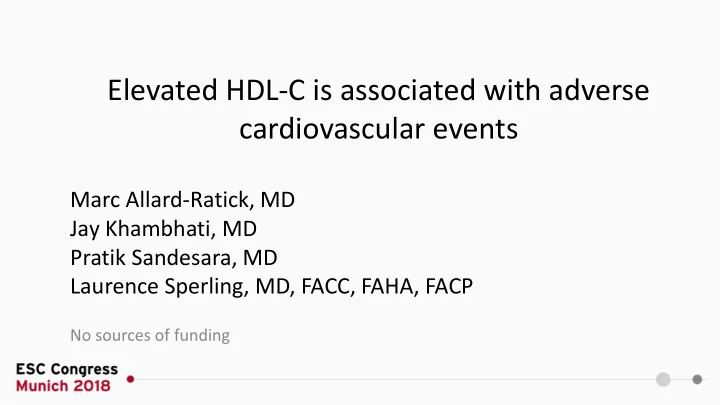

Elevated HDL-C is associated with adverse cardiovascular events Marc Allard-Ratick, MD Jay Khambhati, MD Pratik Sandesara, MD Laurence Sperling, MD, FACC, FAHA, FACP No sources of funding
Conclusions • High levels of HDL-C are associated with increased all-cause mortality and adverse cardiovascular events • Association is likely at levels exceeding 80mg/dL - perhaps higher in females • Unclear whether effects more pronounced in men vs. women
Background • HDL-C inversely associated with cardiovascular disease • Pharmacologic mechanisms to raise HDL-C have generally failed to reduce CV disease incidence • Recently, a “U” shaped association between HDL-C and adverse CV events and all-cause mortality has been shown
Study Design Part of the Emory University Cardiovascular Biobank 5,291 adults undergoing LHC Cohort enrolled Background data obtained at enrollment Hypothesis: Very high levels Subjects followed median of of HDL-C are associated 4.5 (1.8-6.9) years with adverse cardiovascular outcomes in an at-risk population Primary Outcomes: 1) All-cause mortality 2) CV death or non-fatal MI
Figure 1a: Association between HDL-C and all-cause mortality Reference HDL-C 45mg/dL 95% confidence interval *Adjusted for common covariates
Key messages • HDL cholesterol or “good cholesterol” may not be protective of cardiovascular disease or death, and in fact very high levels may be harmful. • Patients with very high levels of HDL should consult their physician. While our study shows an increased risk of adverse events in this population, the mechanism remains unclear. • It is crucial to address other modifiable risk factors such as high blood pressure, smoking, and obesity to reduce cardiovascular disease.
Recommend
More recommend